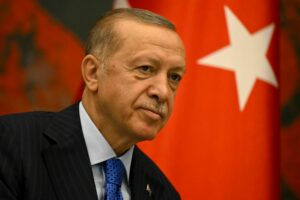An Israeli-born historian of Holocaust and genocide studies criticized Israeli officials’ use of memories of the Holocaust in effort to legitimize their attacks on Gaza, which have so far killed over 16,200 people, most of them women and children.
“To associate Hamas with the Nazis means really that Hamas, and by sleight of hand it refers to the Palestinians more generally – or to Palestinian resistance to Jewish to Israeli occupation more generally – as Nazi. And therefore you don’t talk with Nazis, you kill Nazis,” Omer Bartov, a professor at the US’ Brown University, told Anadolu in an exclusive interview.
Bartov also said that Israeli and Western officials calling Hamas’ Oct. 7 attack a “second Holocaust” carries the risk of stoking antisemitic and Islamophobic sentiments in the West, especially in Eastern Europe.
“What happened on October seventh was really, deeply shocking to Israelis and to many Jews outside of Israel. And it was very shocking. Nothing like that had happened, really, since World War II to Jews in in Israel,” he said.
“The whole idea of Israel as a state, of a state of Jews was based on the idea that such things would never happen again,” he added.
Bartov noted that the Holocaust was a systematic program for the murder of all Jews by the German Nazi regime, and that this cannot be compared with Hamas’s Oct. 7 attack.
“The Hamas attack of October seventh was a terrorist act, was a war crime. But I don’t think that that really makes it comparable to a state like the Nazi state that had a vast apparatus of military, of the SS, Gestapo, that was focused,” he explained.
“One of (the Nazis’) main goals was to exterminate the Jews of Europe … And to compare that to what Hamas did not seem to me historically accurate,” he said, adding that the comparison was “really a kind of propagandistic turn of phrase.”
Bartov said such comparisons are not new, pointing out how in 1982, then-Israeli Prime Minister Menachem Begin compared Yasser Arafat, to Adolf Hitler hiding in his bunker in Berlin.
“That kind of association between the two is something that maybe for Menachem Begin it appeared like the same thing. But historically it was a completely different situation. And that riles up the Israeli public. It gives them an image of all Palestinian resistance as Nazi, and that’s clearly propagandistic, but it isn’t a reflection of reality,” he said.
‘Lessons not learned’
On authorities’ statement that moral lessons should be drawn from the Holocaust with the “never again” rhetoric, Bartov said: “This idea that you draw moral lessons from the Holocaust was very problematic, because the Holocaust was an atrocity, was one of the worst cases of inhumanity. And to draw positive lessons from inhumanity is a little bit of a contradiction in terms.”
Bartov also said the motto “never again” has been turned into a political tool.
“What we should learn from it is not to prevent the Holocaust from happening again, because the Holocaust happened already. It’s to prevent such cases, genocides, hatred, racial hatred from happening again. We should only use it to prevent other such cases, whether they’re against Jews or against Muslims, or against Arabs, or against any other persecuted minority,” he said.
“People like (Holocaust survivor writers) Primo Levi, like Elie Wiesel, had always talked about that we should learn a lesson about humanity, and unfortunately, we have not. I don’t think that Israel is perpetrating genocide at the moment, but I think that that the language that is being used is one that should be stopped right away because it is very dangerous language,” Bartov added.
The historian also said one of the main warning signs of genocide is statements implying “dehumanization.”
“It doesn’t always happen, but one indication that there may be plans or sentiments toward genocide are statements of dehumanization. When you speak about people as vermin, which is the way the Nazis spoke about the Jews, or you speak about people as cockroaches, as the Hutu called the Tutsi in Rwanda, this kind of dehumanization of people carries a particular weight because it allows you to think of them as not entirely human, and as sort of dangerous, like some germ, some plague, something that can hurt you in sort of horrific ways,” he said.
Bartov said that the use of Holocaust memories to explain the attacks on Gaza by political and intellectual figures that can reach a wide audience could encourage racist narratives about Muslims and Jews
Far-right sections of Western society see times of war as an opportunity, he added.
“Most of the antisemitism is not coming from Muslim minorities in European countries or in America, but from the extreme right. If you are a Muslim student at Cornell University, people may harass you not because of what you say or what you believe in, but simply because you’re Muslim and they attribute something to you,” he said.
“And the same with Jews. Jews have been attacked because they’re Jews. Synagogues have been attacked because they’re synagogues, not because anybody knows whether those people support what the Israeli government is doing or not. And so that’s bigotry, and bigotry is and racism has been on the rise in Western Europe and in the United States,” Bartov added.
“Both Islamophobia and moreso antisemitism are being weaponized, are being used so as to shut people up. The Israeli government has been doing it very successfully now for quite a while. That is, it has been saying that any criticism of Israel is antisemitic and that is nonsense.”
Source : aa









